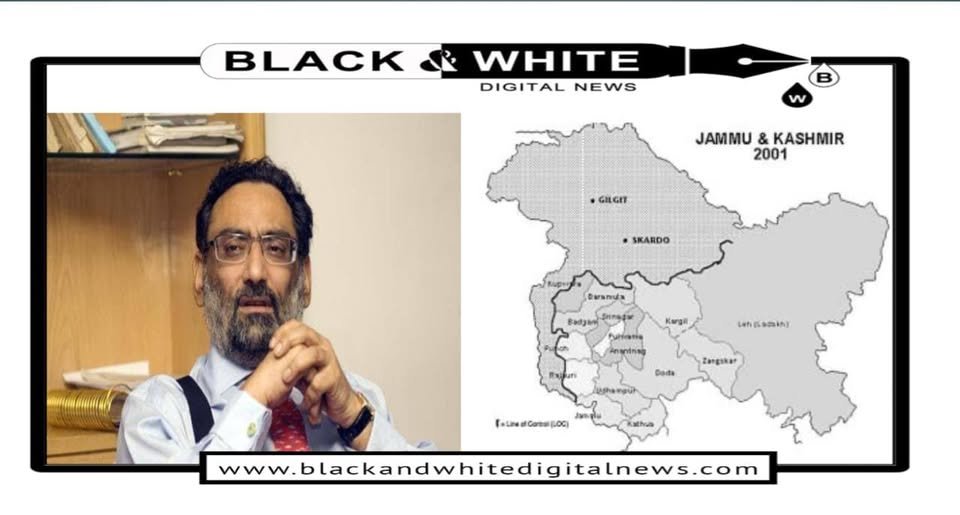Fractured Realities: Former Finance Minister Haseeb Drabu Predicts Prolonged Statehood Delay and Possible Further Bifurcation of J&K.
||Black and White Digital News||
||Parvinder Singh December 05,2024 ||
Srinagar : The recent assembly elections in Jammu and Kashmir have laid bare the stark and growing chasm between the Union Territory’s two principal regions, Jammu and Kashmir. Former Finance Minister of the erstwhile state, Haseeb Drabu, has issued a grim prognosis, warning of deepening communal divides and predicting no return to statehood for at least five years.
Speaking to a media , Drabu expressed concerns about the trajectory of the region, stating that the elections “exposed a clear communal divide,” with voters in Jammu and Kashmir choosing dramatically different political paths. “Jammu voted one way, and Kashmir another,” he noted, describing the once-unified state as “unnatural” due to its lack of shared language, culture, or politics.
The Deepening Divide and a Looming Split:
Drabu didn’t mince words in his analysis of the recent elections, calling it the first in the region’s history where religion, not ideology, dictated the results. “This election marks a departure from the past. It wasn’t fought on ideology but on religion. The message is clear Jammu and Kashmir are inching closer to a split into two separate entities,” he warned.
He further suggested that the reorganisation of August 2019, which led to the abrogation of Article 370 and bifurcation of the state, could serve as a precursor to the complete division of the Union Territory.
Statehood: A Distant Dream:
On the matter of statehood restoration, Drabu delivered a sobering verdict: “There is no statehood coming for the next five years.” Citing the extensive legal, administrative, and institutional changes made post-2019, he explained that unwinding these would require years of concerted effort.
“Restoring statehood is not a simple process. It’s not just a presidential decision. The Jammu and Kashmir cadre of civil services has been merged into a central cadre, numerous statutes have been altered, and the administrative structure has been overhauled. These changes cannot be undone overnight,” he emphasized.
Drabu urged the public to temper expectations, arguing that statehood, if it happens, will depend on evolving circumstances and a phased dismantling of the existing structural framework.
Critique of Delimitation and Poll Processes:
While acknowledging the smooth conduct of the elections, Drabu raised serious concerns about the pre-poll processes, particularly the delimitation exercise. He accused the government of gerrymandering constituencies, particularly in sensitive areas like the Chenab Valley, under the Reorganisation Act of 2019, rather than the traditional People’s Representation Act.
“This structural manipulation of constituencies was a deliberate effort to constrain electoral outcomes,” he asserted, adding that the results reflected the fractured political and social realities of the region rather than a referendum on the abrogation of Article 370.
Development Promises Unfulfilled:
Drabu also critiqued the much-touted development narrative post-Article 370 abrogation. “There is no evidence to suggest that the removal of Article 370 has spurred significant investment or economic progress in J&K. If anything, the region was economically and socially better off than much of India before Article 370 was abrogated,” he remarked.
He argued that the symbolic nature of Article 370 had largely been eroded by the 1960s and its formal removal was more about setting a political agenda than delivering tangible benefits to the people.
In a poignant conclusion, Drabu lamented the shifting identity of Jammu and Kashmir. “The tragedy of this region lies in its journey from an inclusive political identity to one marked by deep religious and regional polarisation. The promise of integration has instead led to fragmentation.”
His remarks paint a picture of a region grappling with political and social upheaval, caught between promises of development and the harsh realities of division. As Jammu and Kashmir navigate these uncertain times, the echoes of Drabu’s words will likely resonate in its corridors of power and among its people.
The future of Jammu and Kashmir remains precarious, and Drabu’s warnings serve as a stark reminder of the complexities that lie ahead for the Union Territory.
Sajad Gani Lone



